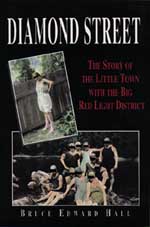

|
Diamond Street, The Story of the Little Town with the Big Red Light District (Black Dome Press, 1994)A note from the author: "Pretty little Hudson, New York. In 1929 it had a population of 8,000, 20 churches, six banks, chapters of the Daughters of the American Revolution, Young Men's Christian Association, Jewish Men's Club, Masons, Elks, Moose, Odd Fellows -- and fully 15 whore houses, neatly managed and protected by the Mayor and the Police Department. It was sort of like Andy Hardy visits Sodom and Gomorrah. Hudson was so famous for its vice (which also included high-stakes illegal gambling) that any man within a couple of hundred miles with two dollars and a sex drive would flock to the little city for a little R & R, with Main Street becoming so clogged with out-of-state cars that locals couldn't find a parking space. "Diamond Street" isn't a book about titillation and
voyeurism, however. It is about a town that has sold its soul for a quick
buck. For over a hundred years, organized vice was essentially the local
cottage industry, while Hudson's "respectable" residents merely
shrugged their shoulders and deluded themselves with the notion that every
town's police force issued official working cards to their local
prostitutes, while pocketing profits from their illicit tourist industry.
In researching the book, I was constantly amazed by the attitudes of
Hudson's senior citizens, almost all of whom were nostalgic for the days
when the "girls" were in residence. "Everybody had a dollar
in their pocket back then," is a phrase I've heard over and over. As
for the "working women" themselves, I have tried to paint a
realistic portrait of what it was like to work in a small-town brothel before World War II. It was none too sweet, I can tell you, with back-room
abortions, occasionally violent customers, and virtually incurable V.D. in
an era before antibiotics. Still, in those days options were few for poor,
single women who might have had kids to support. As one woman reflected
when first offered five dollars for sex during the depth of the
Depression, five dollars would buy shoes for herself and her children. And
as for the man making the offer -- well, he wasn't too repulsive. She
repressed her pride -- and bought the shoes." Library Journal (Wendy Knickerbocker, Jan. 1995) "Hudson, New York, population 8,000, is a town whose handsome Colonial and Victorian architecture boasts a grander past. Hudson was first an important port and then a successful industrial city. One of its most lucrative industries was prostitution, and from the 1780s until state police closed down its operations in 1950, Hudson was known far and wide as the place to go for a good time. This work chronicles the history of prostitution in Hudson, along with the social conditions and political corruption that allowed it to flourish. Hall has produced a lively and engaging local history, written in a conspiratorial tone that immediately draws in the reader. His liberal use of anecdotes gleaned from interviews and personal papers and 40 period photographs enliven this tale of sin in a small town." |
|
I Thought My Father Was God; and Other True Tales from NPR's National Story Project, $1,380 Per Night, Double Occupancy Tea That Burns : A Family Memoir of Chinatown American Heritage A Walk Through Chinatown with My Great Grandfather TimeOut The Forbidden City Also by Bruce Edward Hall | |